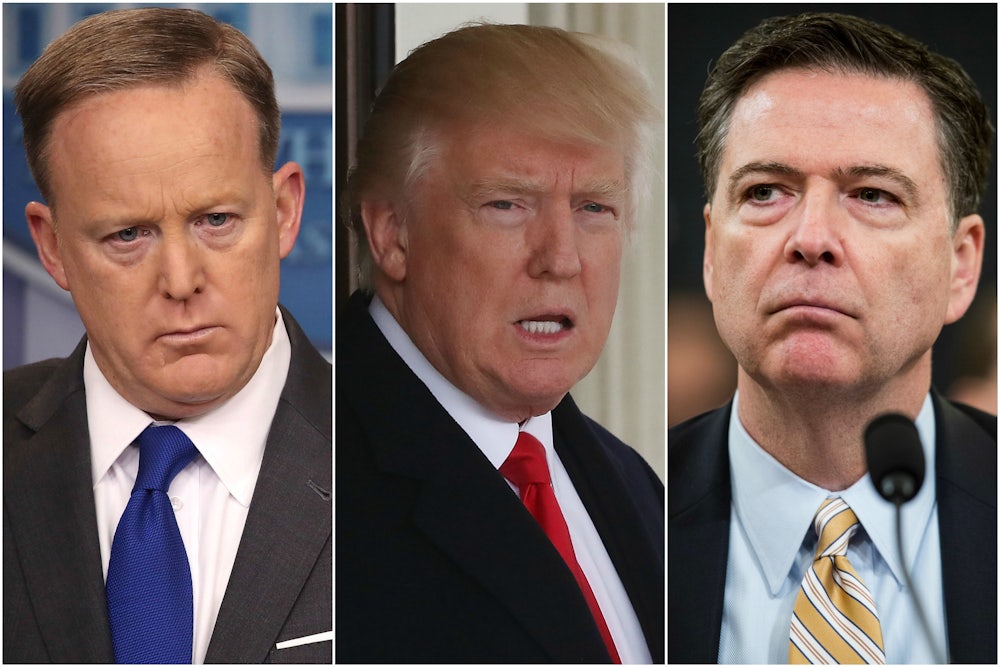The Trump White House’s contempt for the press—and for the more general notion that there are inconvenient truths in the world that can’t be denied out of existence—is so well established by now that many of us who cover politics have become desensitized to its constant manifestations.
But sometimes, the administration’s dissembling is so egregious that it can’t be laughed off, such as on Monday when White House Press Secretary Sean Spicer revised the history of the Trump campaign, transition, and the early days of the administration to write central characters into trivial roles.
At his daily briefing, Spicer referred to now-deposed national security adviser Michael Flynn as a “volunteer of the campaign” and Paul Manafort—who was Trump’s campaign manager—as someone “who played a very limited role for a very limited amount of time.”
Spicer: Former Trump campaign chief Paul Manafort played a "very limited" role for a "very limited period of time." https://t.co/q3gqLwbrqb
— CNN (@CNN) March 20, 2017
As Spicer spoke, FBI Director James Comey was testifying on Capitol Hill, where he both disputed Trump’s claim that he was unlawfully wiretapped last year by President Barack Obama and confirmed that the FBI is “investigating the nature of any links between individuals associated with the Trump campaign and the Russian government and whether there was any coordination between the campaign and Russia’s efforts … includ[ing] an assessment of whether any crimes were committed.”
It is hard to say, exactly, how a presidential administration should behave when it has been the beneficiary, wittingly or unwittingly, of foreign interference on its behalf. The U.S. intelligence community has already concluded that the Russian government sabotaged Hillary Clinton’s campaign to bolster Trump’s candidacy. Even under the most innocent of circumstances, Trump and his senior aides would find themselves in the awkward position of having to contend with the role that dirty tricks played in their rise to political power.
But the defensive, contentious posture they have adopted—marked by obfuscation, deflection, and wild counterpunching—doesn’t call to mind the temporary embarrassment of a political team benefiting from the interference of some noxious but unaffiliated entity, like the Swift Boat Veterans for Truth that smeared Democratic nominee John Kerry in 2004. They’re acting like cornered animals. And though Trump’s response to these developments is dressed up with the trappings of the presidency, including a White House press secretary who speaks on his behalf every day, it bears all the hallmarks of his standard reaction when his unsavory associations come back to bite him. This is vintage, guilty Trump.
In the following video, filmed a few years ago, a BBC reporter asks Trump to account for his deep entanglements with Felix Sater, a Russian gangster and FBI informant whose name recently resurfaced when The New York Times reported that he has a backchannel to the White House through Trump’s personal lawyer, Michael Cohen.
Here, again, Trump’s instinctive response is to avoid any association with his partners’ wrongdoings by pretending they’re more like acquaintances.
“I know who he is,” Trump allows reluctantly, when he realizes outright denial won’t work.
The pattern was well established before Trump had the machinery of the White House behind him. He devoted his official Twitter feed on Monday afternoon to posting deceptively edited and summarized video clips from the Intelligence Committee hearing, to make it appear as if Obama were the real villain, that Comey’s testimony had exonerated him, and that Russians didn’t meddle in the election when, in fact, the exact opposite was true.
It is easy enough to imagine a version of events in which the Russian government determined its preference for Trump over Clinton and consequently sought to influence the outcome of the election in complete isolation from the Trump campaign, like a kind of rogue, sovereign, lawbreaking super PAC. If at bottom, Trump had confidence that his associates never colluded improperly or illegally with the Russian effort to sabotage the election, he might see it as in his interest to let an investigation proceed unencumbered.
You send your spokesman out to make an ass of himself, and pretend your closest advisers were mere hangers on, when you’re afraid of what that investigation might turn up.
